A rider that I have been in awe of since I first discovered Instragram is Bailey Notle (@joyful_dressage). As you browse through Bailey’s Instagram feed you will be blown away by her super talented mare Fair Joy. At just 23 Bailey has an eloquent manner and a maturity far beyond her years and the love that she has for her mare is literally palpable. After drafted several messages to Bailey, I finally got the nerve to ask if I could share her story with you all, and I was absolutely thrilled when she agreed.
We started off by asking Bailey how she found herself in the wonderful of equines…
I first started riding when I was three years old! My grandma bought me a horse breed book prior to my third birthday and my parents found themselves reading the various breed descriptions to me as bedtime stories. Shortly after, I was reciting the various names and origins, and I got my first “pony ride” as a birthday present. I was hooked! A lot of my love for horses came from a natural love of all animals, no matter their species. I found solace in them.
Even at a young age, I was introverted and anxious. It’s hard to understand those psychological traits when you’re a young child, but I knew I was uncomfortable with people and didn’t know why. Even just doing barn chores brought me a sense of purpose and comfort. This idea of selfless, responsible service for an animal so empathetic and that I was emotionally bonded to was centering. It still is! It helped that my desire to learn was astronomical and while I was a terribly uncoordinated child, I was comfortable and confident at riding.
The greatest things that drew me to horses was this innate desire to understand them, as they don’t judge, laugh, or want anything from you. The relationships I built were much more attractive than just the riding. 20 years later, I have a lot of the same feelings, and the relationship with my horses is what keeps me motivated more than anything.
I was curious to know what disciplines Bailey had tried, and what drew her to dressage
Well, after a basic understanding of walk/trot/canter, I quickly learned that jumping was a thrill that had been missing in my short life! Looking back, I think I probably would have had a fun adult amateur career as a show jumper or an eventer had I pursued it, but I’m happy I ultimately ended up in
Apple, my childhood pony that I still have to this day, was my introduction to
Dressage was something I didn’t choose for myself. I was at a schooling show when I was 11 and was asked to warm up someone else’s three year old Appendix Paint. He was sensitive and anxious, something I knew about all too well, and we just clicked. Shortly after, I began leasing him. I was technically outgrowing my pony anyway, so it was the next step in riding for me. Boston, as this gangly, mousy grey and white paint was known, was an uncoordinated, nervous, but overall kind youngster. He didn’t want to do anything wrong. As we started basic
As I got older, I was able to impart all the things I had been learning beneficially onto other horses I was riding, Apple included. After a good six years together, Boston and I parted ways under unfortunate circumstances. By that time, I had become a working student, helped manage a breeding stable by taking care of day to day operations and helping produce young Trakehner stock, and become heavily invested in learning about producing young horses through classical methods. While I had worked with a couple of “guinea pigs”, I now had Joy to start preparing for backing.
Bailey has been open about the challenges she has faced with anxiety and depression and I wanted to know what prompted her to speak out about this?
To try and fight the stigma! I hate saying I “suffer” from depression and anxiety because it does not and will not rule my life. It’s just another part of me. There was no trauma in my life that caused it, as like most anxiety/depression, my issues are hereditary. The more I talked to people in college and online through social media, I realized just how many people felt that they couldn’t talk openly about their mental health issues. That they would get punished for talking about something going on in their mind instead of being taken seriously, just because the trouble isn’t visible. It made my blood boil. Being unable to talk about your own mental health is stifling and contributing the lasting stigma. Why can’t we talk about Trintellix [an antidepressant] the way we talk about blood pressure medication?
I grew very close to two people who suffered from much deeper trouble than I did and had been raised in families and communities where mental health was pushed aside. In the end, both attempted suicide for different reasons and in different ways. Neither succeeded, but the harm to their families was done. It felt like most of it went by in a daze; talking to their family members, visiting, and trying to get them help with their long-lasting trauma.
I was fed up, listening to people talk about mental health like it was an embarrassment to themselves or their families. I had also just started really getting into social media as a tool for connecting with young equestrians and other like-minded people. I decided that I wouldn’t be ashamed and would try to lead by example, brushing off the social belief that anxiety/depression or medication for either makes you less of a person. At the very least, maybe someone who needed advice or even just a listening ear would have an outlet.
The response has been amazing and I’m so thankful I took the chance. Right now, I’m far from medication free, but I’m 100% okay with that. Being open about the daily nonsense that goes on in my head was a helpful step towards a more confident outlook on how to manage my mental health issues.
We talked about Bailey’s plan for the future.
Right now, I’m just heading into my first year of law school so things are a little up in the air! I have huge interest in constitutional law and corporate communication litigation. Ultimately, I would like to work in mental health advocacy but that will be my passion project once I pay off my student loans! It’s an exciting future with a wedding on the way in March, a foal in April, and school taking over my life for the foreseeable future.
Life is a balancing act, particularly when you throw horses into the mix. I asked Bailey how she has managed this herself.
Early mornings, late nights, a planner, and tons of coffee! A lot of it is simply finding balance, making sacrifices, and schedulng. I was lucky to not work full time, but I was still working while taking 15-18 hours in school. The horses were a true full-time job and were treated as such. I would take my homework to shows and study between rides, wake up early enough to get a ride in while the weather was cool enough or riding late at night when I got home from class. Academia and
As for relationships, I was lucky that my fiancé knew about my “horsey affliction” and my school affairs long before we started dating. To give you some background, we met at a summer internship in 2015 and started dating late that fall. He saw firsthand the mornings I would come to our internship covered I mud from early mornings with the horses or stressed in my office cramming for my Law School Admission Exam. He also saw plenty of pictures of them, because I have no self-control. Once we began spending time together, he got a crash course in just how important the horses were to me and horse handling 101. I’m the luckiest girl in the world that he saw how much they mattered to me and took initiative to ask questions, educate himself, offer to help, and understood that they were always my first priority.
Having a supportive significant other was really an earth shifting moment. For a long time, relationships were on the back burner as I was too focused on my horses to really make time for a boyfriend. Not to say I didn’t have relationships, but they were far from successful. Clearly, as none of them lasted! It’s about waiting for that person that not only cares about your endeavors, but also supports them selflessly and is willing to sacrifice their own time, whether that be date nights or weekends spent at shows instead of relaxing, to make a relationship work. It can’t be one sided. That goes for everything, but especially equestrian girls.
When I asked Bailey what advice she has for other riders, I got some golden nuggets of wisdom.
Oh I have a lot, in all honesty.
Stop comparing your journey to someone else’s. Everyone is on a different path, with different horses and funding and training. It’s an exercise in futility to look at other people’s successes and compare them to your own. No one is on the same exact track with the exact same horse. The only person you should be comparing yourself to is yourself. Ask yourself if you feel your improvement, are your scores better than last time, is your relationship with your horse happier? If all those are yes, nothing else matters.
2nd,
3rd, function over fashion. While yes, even me, is driven to post an occasional #rootd if I’m feeling myself, I rarely look even remotely “Instagram worthy”. But who cares? Your appearance isn’t everything. You might promote a fake image by having the most expensive tack or horse or riding clothes, but remember that simplicity breeds discipline and self-respect. Use that money to take extra lessons or travel to a clinic or get your saddle reflocked. Those things are more important and educational. Let your actions speak for you, not your matchy matchy outfits.
4th and finally, continuing your education is something you must take the initiative on. While you’re younger, it’s hard to audit clinics or volunteer, but that doesn’t mean you can’t ask. Even online, don’t be afraid to ask questions, as long as they aren’t in an accusatory or blameful manner. You can learn something from everyone, whether it’s something you want to emulate or something you want to avoid. Study tests, audit lessons and clinics, shadow a trainer or a vet or a farrier, catch ride horses, work as a working student or even a barn hand, and ask questions until your tongue bleeds.
Takes notes. Treat it like studying. If you want to succeed, you need to be humble and eager to learn, but also steadfast in your beliefs about what is right and wrong. If you persevere, there’s no way you can’t be at the bare minimum, personally fulfilled.
Stay tuned for part two where I talk to Bailey in depth about her super mare Fair Joy.
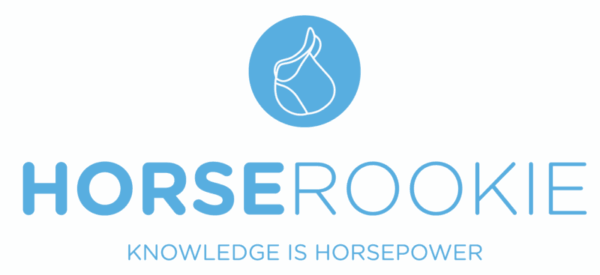

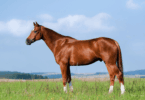
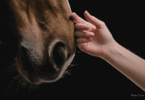
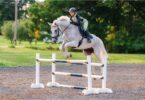

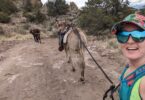
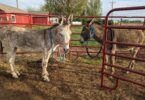
I love your features of other riders 🙂 they are interesting and really does so much towards building our community. Thank you!
Thank you so much! I really want to use my ‘voice’ (although pretty small) to raise other riders and horse people up.
Your voice is greater than you think <3
That’s so kind of you – I really appreciate your words
I love your features of other riders 🙂 they are interesting and really does so much towards building our community. Thank you!
Thank you so much! I really want to use my ‘voice’ (although pretty small) to raise other riders and horse people up.
Your voice is greater than you think <3
That’s so kind of you – I really appreciate your words
Nice to “meet” you Bailey! Great interview and I loved learning more about your background and journey. I agree to that we shouldn’t compare ourselves to others, with riding or otherwise. Being yourself is about celebrating what is special about you. Not how alike others you are. And I also agree that dressage is good for every horse. My barn is primarily hunter/ jumper but my trainers teach us basic dressage because it helps us to achieve balance, straightness, and timing when it comes to riding and jumping. All of which is extremely important. Can’t wait to read Part 2.
Thank you Heather! This is super advice because the comparison trap is such an easy one to fall into, but no one will do things exactly the way that you do! This is a good thing.
Back in the day when I still jumped one of my incredible coaches used to say that jumping is just dressage over sticks. I think if I was in America I might be a Hunter princess instead of a dressage diva hehe
Nice to “meet” you Bailey! Great interview and I loved learning more about your background and journey. I agree to that we shouldn’t compare ourselves to others, with riding or otherwise. Being yourself is about celebrating what is special about you. Not how alike others you are. And I also agree that dressage is good for every horse. My barn is primarily hunter/ jumper but my trainers teach us basic dressage because it helps us to achieve balance, straightness, and timing when it comes to riding and jumping. All of which is extremely important. Can’t wait to read Part 2.
Thank you Heather! This is super advice because the comparison trap is such an easy one to fall into, but no one will do things exactly the way that you do! This is a good thing.
Back in the day when I still jumped one of my incredible coaches used to say that jumping is just dressage over sticks. I think if I was in America I might be a Hunter princess instead of a dressage diva hehe
Wow, this was a lovely read! I get so much motivation from this! Bailey sounds and looks like a precious equestrian! Can’t wait for part 2!
Thank you so much for your kind words Mathilda. Bailey certainly is a gem and a wonderful role model
Wow, this was a lovely read! I get so much motivation from this! Bailey sounds and looks like a precious equestrian! Can’t wait for part 2!
Thank you so much for your kind words Mathilda. Bailey certainly is a gem and a wonderful role model
[…] week I shared Part 1 of my ‘interview’ with Bailey, where she shared about how she found her way into the […]
[…] week I shared Part 1 of my ‘interview’ with Bailey, where she shared about how she found her way into the […]
[…] my only way of learning. I didn’t even realise it had happened until my recent interview with Bailey Notle who reminded me of the importance of continuous […]
[…] my only way of learning. I didn’t even realise it had happened until my recent interview with Bailey Notle who reminded me of the importance of continuous […]